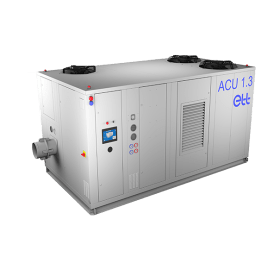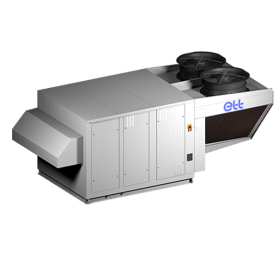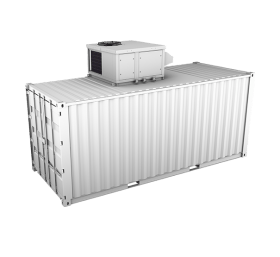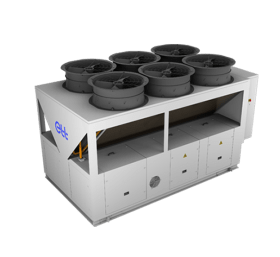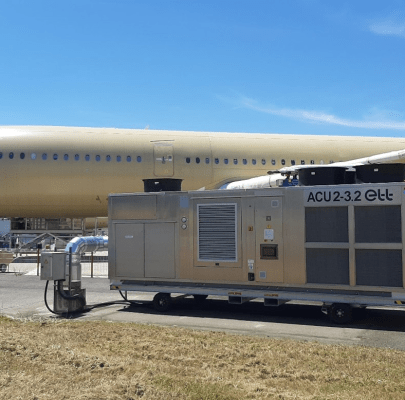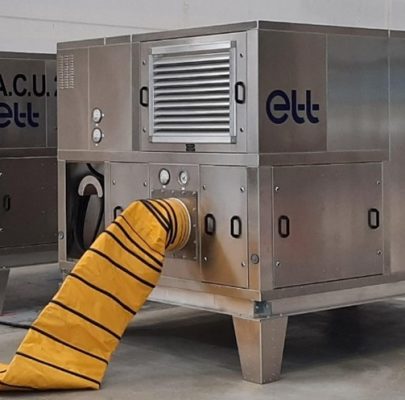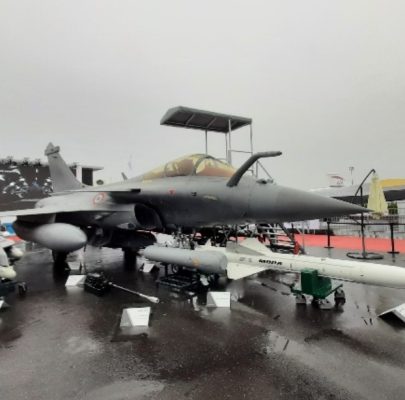ETT, in tune with the needs of the aeronautical and airport industries
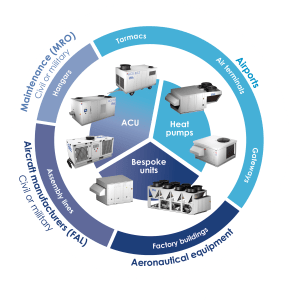
Air conditioning units are designed to replace the APU while reducing the carbon footprint. The PCAs in our ACU range have been developed according to aircraft types and LPGC connector requirements to provide the pressure, airflow and temperature needed for cooling and heating in APU OFF operation.
PCA/ACUs (Aircraft Air Conditioning Units) are specially designed to cool the avionics bay and ensure optimum comfort for users in the aircraft by cooling, heating or ventilating the aircraft when it is on the ground.
The Aerospace Market is committed to reducing its CO₂ emissions to achieve carbon neutrality by 2050.
ETT is committed to an eco-design approach aimed at reducing the environmental impact of all its machines, from design to dismantling.
The refrigerants used have no impact on the ozone layer and have a very low "Global Warming Potential".

Energy performance (SEER and SCOP) is consistently among the best on the market.
In accordance with the French Environment Code, ETT is a member of ECOLOGIC for the collection and recycling of its end-of-life units.
ETT's French manufacturing quality ensures the reliability and longevity of its machines.
Whether you are an airport operator, a design office specialising in aeronautics or an aircraft manufacturer, you are undoubtedly faced with this problem:
- Reduce CO₂ emissions with APU OFF operation.
List of flue gas components:
| CO | Carbon monoxide |
| CO₂ | Carbon dioxide |
| HC | Unburned hydrocarbons |
| COVNM | Non-methane volatile organic compounds |
| NOx | Nitrogen oxides |
| PM10 | Particles with a diameter of less than 10 microns |
| Type of aircraft | ||
| Data | Short / Medium haul | Long haul |
| APU operating time | 45 min. | 75 min. |
| Fuel consumption | 80 kg | 300 kg |
| CO₂ emissions | 252 kg | 945 kg |
| NOx emissions | 700 g | 2,400 g |
| Emissions of HC assimilated to NMVOCs | 30 kg | 160 g |
| CO emissions | 310 g | 210 g |
| PM10 emissions | 25 g | 40 g |
Source: CITEPA* guide, DGAC 2007
CITEPA*: French Interprofessional Technical Centre for the Study of Atmospheric Pollution
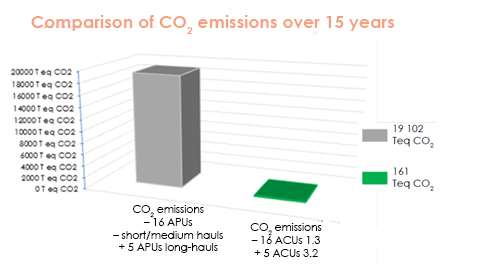
- Saving energy: The thermodynamic system is an effective, economical and environmentally-friendly solution for cooling aircraft. It uses very little energy for optimum performance.
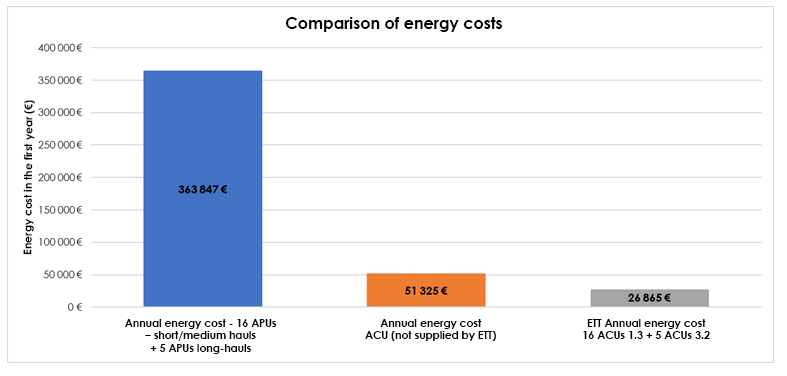
- Modularity and adaptability: Because mobility is a key factor in the aeronautical market, ETT units can be easily installed on the tarmac in a mobile version, making them easy to move (ACU - towable mobile version).
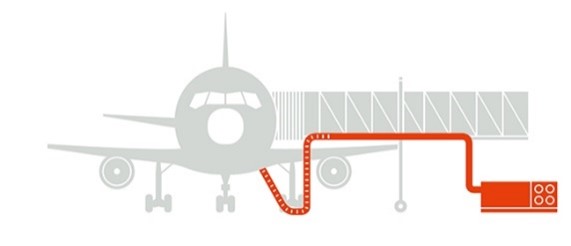
The combination of a lightweight aluminum construction with a 20-year anti-corrosion guarantee that can be recycled, and the use of high energy efficiency components, aligns with a demanding economic context that favours overall cost.
To meet strategic and operational challenges and integrate flexibly into the world of aeronautics, ETT develops and designs solutions that integrate:

ACUs are the perfect replacement for APUs since their 100% electric thermodynamic operation eliminates the CO₂ and NOx emissions generated in significant quantities during stopovers in ‘APU-ON’ mode.
This is a major constraint and often restricts the on-site operators. Various solutions exist, involving the integration of specific components and/or optimisation of the machine's control system.

ETT has equipped itself with a climatic chamber in order to put its equipment through its paces in real operating conditions, within a given dimensional limit. This service enables us to check the advertised performance and regulation functions.

ETT equipment very often interacts with other equipment on site. It is therefore necessary to take these constraints into account so that our control system can adapt and communicate.

ETT offers you a total solution, with the option of standard or made-to-measure ventilation ducts and aircraft PCA fittings.

Dimensional constraints are very often the source of integration difficulties when replacing existing equipment. ETT's strength lies in its ability to offer completely customised machines that fit in with their environment.
ETT has developed a remote supervision tool integrated into the machines. The aim is to offer manufacturers a way of monitoring their machines, and also to enable ETT to provide fast, reliable expertise. Other services are also integrated.
Have a project?
New build
Refurbishment
In pictures...
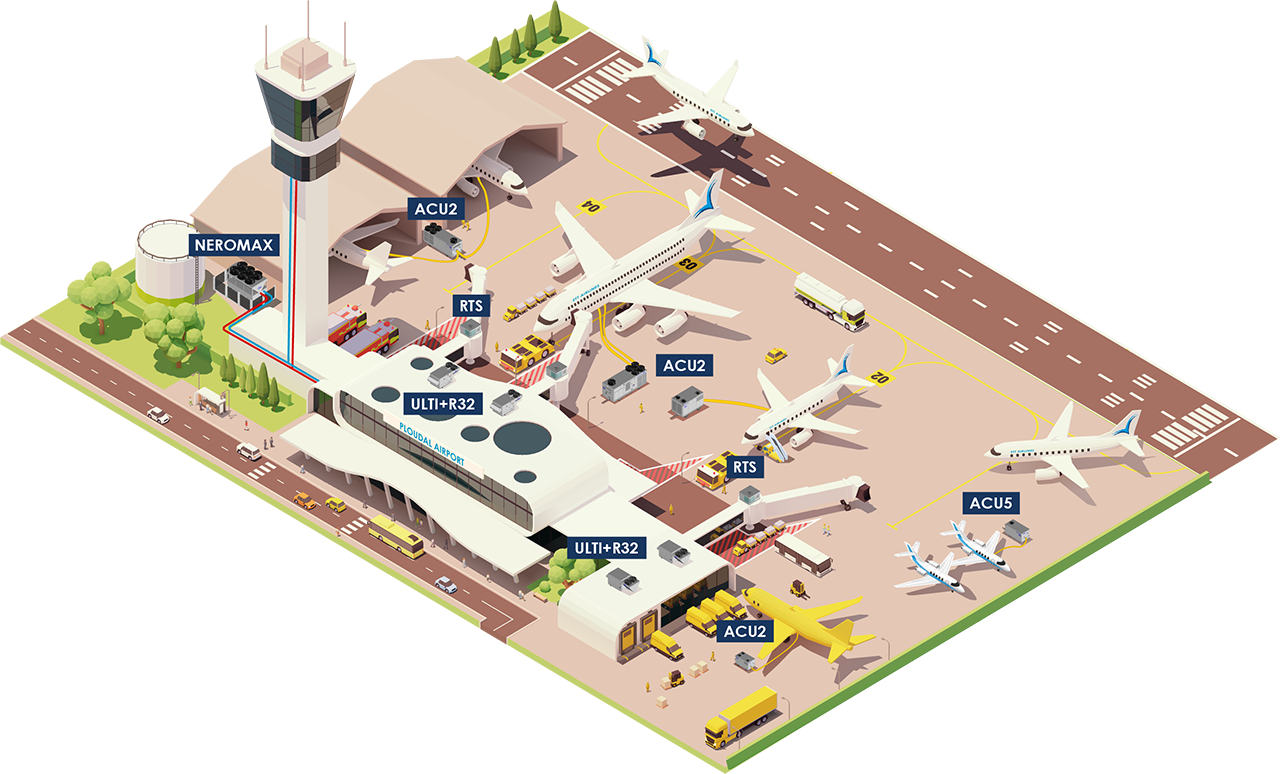
Dedicated solutions
Have a question ?
A project ?
Expertise dedicated to the aerospace market
For several years now, our specialised structure (Technical, R&D, Quoting) has been exclusively dedicated to meeting the needs of the various players in this market.
Since 2002, ETT has been offering an aeronautical range to meet the needs of a variety of applications:
- Aircraft manufacturers
- Airports airside
- Air terminals, with machines dedicated to building air treatment
- MROs


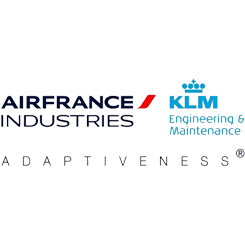
Regulations
The ACA (Airport Carbon Accreditation) programme is an initiative set up by ACI Europe (Airports Council International) to certify the carbon management of partner airports. It assesses and recognises the actions taken by airports to reduce their greenhouse gas (GHG) emissions and improve their energy efficiency. Airports can choose to participate and be ranked according to their carbon management practices by an independent authority. The assessment includes a progressive ranking over 4 levels, the last of which is carbon neutrality.
The order of 28 July 2023 on the use of auxiliary power units (APU). The aim of new decrees is to limit the use of APUs by aircraft on stopovers (Trans-European Transport Network (TEN-T)).
The FGAZ III regulation on the use of refrigerants in conjunction with the PED regulation (Pressure Equipment Directive).




